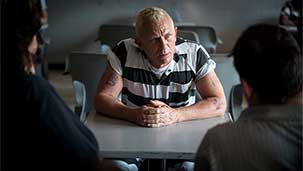The biggest surprise of Logan Lucky was seeing your name at the end. It was strange that I’d never heard of you before now. Female screenwriters so rarely get sole-credit on genre films that it felt significant. The fact that you penned Steven Soderbergh’s return to cinema – a bro-centric heist film, no less – meant I had to look you up. What did I find? Well, it seems you’re in even more exclusive company than I thought: the same ranks as Mary Ann Bernard and Peter Andrews.
You know, Soderbergh’s aliases.
This is unconfirmed, of course. There are rumours that you could also be Soderbergh’s wife, Jules Asner. Or maybe you really do exist, Rachel. But it seems highly unlikely, despite Soderbergh’s cagey protests and subtle accusations of sexism for questioning your existence.
Still, I’ll respect that concept and focus on your work – not the person.
Logan Lucky is a film about robbing NASCAR but is afraid to push too hard on the gas. Rather, it’s a character piece about a dad trying to make ends meet and maintain a relationship with his daughter. There are no guns, no car chases – no real action to speak of in the “genre” sense of the word. But there are other enjoyable tropes, such as getting the gang together, pulling off the heist, and then a twisty ending that provides an alternate version of what really happened. The earlier elements all work rather well, in large part thanks to some bang-up casting with Channing Tatum, Adam Driver, and Daniel Craig as a bomb specialist named… Joe Bang. His is the kind of character name that reads like a first draft joke, but ends up feeling perfectly fine in a low stakes caper film. The women are used much more sporadically (a little too sporadically, “ma’am”), but include Riley Keough, Katie Holmes and Katherine Waterson. Seth MacFarlane makes a less successful appearance, and Hilary Swank seems game for her limited role, even if it’s a late attempt at larger world building that doesn’t totally pay off. In fact, the entire last third of the film feels far too much like a writer trying to be too clever, without putting our satisfaction (or basic logic) first.
Tricking the audience is nothing new to a Soderbergh film. His Ocean’s 11 trilogy is the epitome of fast and loose heist films that tighten up to a stranglehold by the end (to varying degrees of success). Even within Logan Lucky, the redneck robbery is referred to as “Ocean’s 7/11” by the media in a knowing nod. But while the director may be willing to tip his hat in moments like this, he also takes bit too much pleasure in denying us simple facts that don’t add up to a more satisfying mystery.
Sound familiar?
The reality is this: either you’re a welcome addition to an overly homogenous screenwriting demographic, or a lazy misdirect to try and inspire change without being real change. If the answer is anything like the film itself, I’m assuming it’s the latter.
Sincerely,

Christopher







